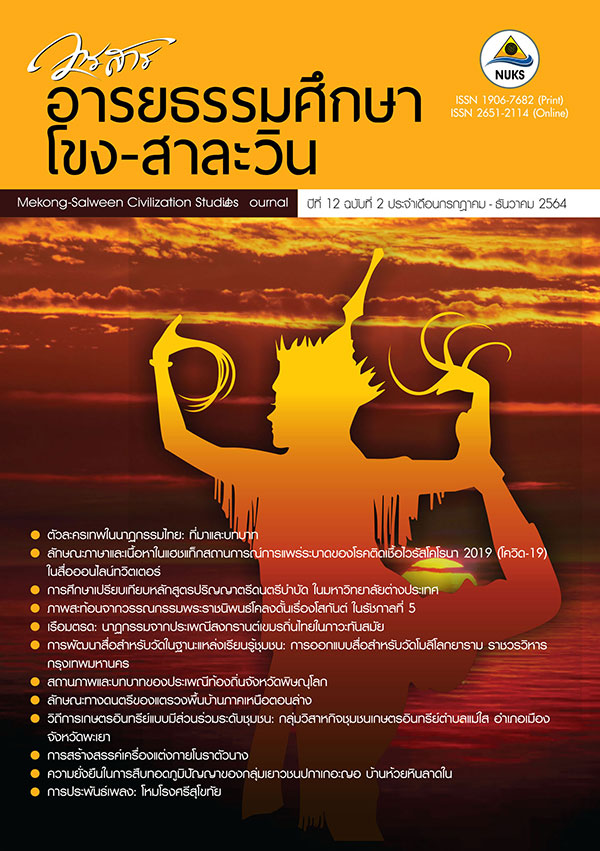God Characters in Thai Dramatic Work: Background and Role Play ตัวละครเทพในนาฏกรรมไทย: ที่มาและบทบาท
Main Article Content
Abstract
The purpose of this article was to study the background and role play of god characters in Thai dramatic work focusing on literatures and performances. In this study, research instruments were reviewing books, textbooks, thesis, articles, literatures, and dramatic work dialogues and interviewing. The data were then analyzed in order to find the background and role play pf gods in Thai dramatic work. It was found that gods were a group of performers as appeared in the performances of a lot of Thai dramatic work that had the background and specific role play based on 3 groups of beliefs: 1) gods in dramatic work from beliefs of Hinduism religion that received the influence from Ramakien, the great epic poems of India, which could be divided into 5 groups of gods, namely high gods, secondary gods, angels, servant deities, and demon gods, 2) gods in dramatic work from beliefs of Buddhism religion that received the influence from Jataka tales which had the Indra god as the leader of all gods, and 3) gods in dramatic work from ancient beliefs which received the influence from narratives, tales, and folktales as appeared in the form of local spirit that later on took the name from Indian gods to call which also related to their miracle powers. Apart from appearing in Khon performance and Lakorn stories, gods in Thai dramatic work were still found in dance performing, Rabam, and royal playing in a short episode also.
Downloads
Article Details
References
Bunditpatanasilpa. (2017). 100 year memorial Kru Arkhom Sayakhom. Nonthaburi: Thaipoom publishing.
Chueinta, S. (2001). An analysis study of the role of Indra in Lanna Pannasa-Jataka (Master’s Thesis). Chaing Mai University, Chiang Mai.
Jongda, S. (2021, July 17). Interview by B. Anyapho. [Tape recording], Soi Bangwag 138, Bangkae, Bangkok.
Panseng, C. (2018). Long Song Dance: God Indra. (Bachelor’s Thesis). Bunditpatanasilpa Institute, Bangkok.
Poonpipat, N. (2019). Gods in thai literrature: Roal of creator and destroyer. Ganesha Journal, 15(2), 69-82.
Sangthong, J. (2019). Mythology and World Views of Greek Society. Journal of Philosophy and Religion, Khon Kaen University, 4(2), 108.
Sathienkoset. (2008). Som Ya Pi Than Ramakien. Bangkok : Siam.
Thongaram, K. (2015). The Script Making of Thai Mask play of Fine Arts Department. Journal of Fine and Applied Arts, Khon Kaen University, 7(2), 107-130.
Tubtimhin, N. (2018). Long Song Dance: The Bathing of Lord Shiva. Retrieved from http://rdedu.bpi.ac.th/research/myfile/BPI20190625094522_4Nitipong.pdf
Vingwon, S. (2012). Literature of the Performing Arts. Bangkok : Saksopha.
Virulrak, S. (2004). Principles of periscope dance. Bangkok : Dansutha.
Yupho, D. (1988). Dance Theater Arts or Thai Dramatic Arts Guide. Bangkok : The Fine Arts Department.


